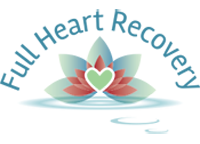At Full Heart Recovery, we specialize in the treatment of addictive disorders such as sex addiction, substance use disorders and alcohol use disorder. Addiction is a mental health disorder, not a moral failure or lack of discipline.
Therefore, we believe that individuals struggling with addiction deserve expert clinical care that is effective, time tested and evidence-based. Our practice provides a private, safe, and serene atmosphere for addicts and their families to begin to heal and rebuild from the devastation of addiction. As licensed therapists, we understand that every person who seeks services at Full Heart Recovery is a unique individual presenting with their own needs, life history and distinct experiences. We recognize that a ‘one size fits all’ model of addictions treatment is not the most effective way to help our clients meet their recovery goals. Our commitment to utilizing scientific, cutting edge technology and gold standard interventions allows us to provide our clients with the highest quality of care.
Your first appointment at Full Heart Recovery will last between 80 to 90 minutes. During this appointment you will meet with a licensed mental health professional (therapist) who has extensive training in the treatment of sex, chemical and process addictions. The therapist will conduct a psychological and social assessment, taking into account any other co-occurring conditions that may exist (i.e. ADHD, Depression, Anxiety, Cognitive Issues, Bipolar Disorder, etc.). As part of our assessment, we may utilize confidential computerized screenings such as the “Sexual Dependency Inventory 4.0,” “Partner’s Sexuality Inventory” and/or additional clinical screenings. In some cases, we may recommend additional psychological testing such as the Minnesota Multiphasic Personality Inventory (MMPI), Intelligence (IQ) testing or neuropsychological assessments that can be conducted in the privacy and comfort of our offices. At the conclusion of your first appointment, the therapist will have a preliminary diagnosis and begin to develop a treatment plan that addresses your specific needs. It is important to note that treatment plans change throughout therapy as the clients report new information.
For clients who present with a history of chronic relapse, dual addictions or who wish to address the brain dysregulation that is often found in addiction, we utilize state of the art Quantitative Electroencephalogram (QEEG) “Brain Maps.” The Center for Neurofeedback, also housed within our suite, is a state of the art facility, which offers customized training programs for clients. After the therapist has interpreted and carefully reviewed the results of any computerized assessment conducted, the results will be presented in a subsequent appointment. If a client elects to have their brain “mapped” the therapist will discuss the results and design an appropriate Loretta Z score neurofeedback protocol to train the addiction and executive networks of the brain. By incorporating Biofeedback and/or Neurofeedback training into our addiction treatment we find that clients feel more relaxed, learn to self-regulate at a faster rate than other individuals and reduce their risk of relapse. Bio and Neurofeedback have also been found to help partners of addicts in reducing their symptoms of anxiety, depression and Post Traumatic Stress Disorder (PTSD).
Our various treatment interventions address the biological, psychological and social origins of addictive and compulsive behaviors. The core components of our addictions treatment programs involve individual psychotherapy with a therapist who will utilize multiple treatment modalities such: Cognitive Behavior Therapy, mindfulness practices, psycho education, Patrick Carnes’ task method and psychodynamic approaches.
In both group and individual therapy, the client will learn practical tools to withstand urges, cravings, triggers and traumatic recall. Over time the client and the therapist will explore and address the emotional roots of the client’s addiction, fostering insight into unconscious patterns in one’s life, obstacles to developing intimacy and allowing one’s true self to emerge. We find that once an individual establishes more long-term sobriety they can begin to develop deeper relationships with their partners and families. At this point many of our clients choose to enter couple’s therapy to renew and enhance their intimate relationships.
Through the use of group therapy, our clients realize that they are not alone and begin to learn about themselves by engaging in the group process. Group therapy is considered one of the most effective interventions in the treatment of addiction. Group provides a healthy environment in which participants can to share their frustrations, successes, foster empathy for others and begin to develop supportive relationships that are based on honesty, integrity and common goals. Our various psychotherapy groups are tiered and designed to support our clients through the various stages of their recovery. Additionally we facilitate mindfulness- based psychology therapy group for individuals who have longer periods of continuous recovery. In this group, participants learn to observe their emotions and thoughts without judgment and continue the practice of cultivating compassion, love and empathy for themselves and others.
